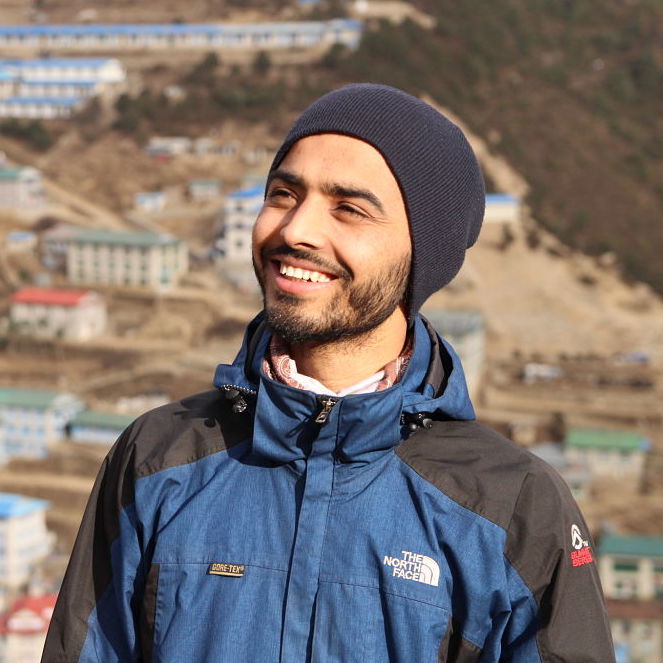- Send a message
- +31 6 87 54 22 50
The Upper Dolpo Trek takes “off the beaten track” to a whole new level. It’s like a different world. Dolpo is an extremely remote and spectacular corner of the Himalaya, isolated from the rest of Nepal by high passes in the south. This trek itself is one major highlight.
This is a grand 20-days adventure. And of these, there will be 13 walking days in Dolpa.
Dolpa is a unique region, isolated from the rest of Nepal by high passes in the south. This camping trek in untouched Dolpa, is truly a unique experience. Upper Dolpo is the highest area of the region.
The Upper Dolpo Trek itself, is actually one major highlight. But, to name 2 places along this route in particular we name: Dho and Phoksundo Lake.
Dho is a village in the beautiful valley of Dho Tarap, a remote valley of pure Tibetan influence. It consists of several clusters of closely packed stone houses. Scattered across the valley, you find numerous Buddhist monasteries and chortens. For instance, above the village you find the beautiful Ribo Bhumpa Gompa.
The lake of Phoksundo is north to Ringmo, a village that’s located on a 30,000 to 40,000 year-old landslide dam. This dam formed the lake on one side and a 167 meter tall waterfall on the other side. The lake is surrounded by glaciers and known by its magnificent turquoise color.
Yes! Actually, we encourage you to do so. So, you can make the Upper Dolpo Tek unique and truly YOURS! Obviously, you don’t need to figure it all out by yourself. We are here for you. Do you want to speed up and make it more challenging? Or, take it nice and slow? Just contact us, and let us know what you’d like to do.
We are looking forward to hearing from you.
– Govinda & Lilly
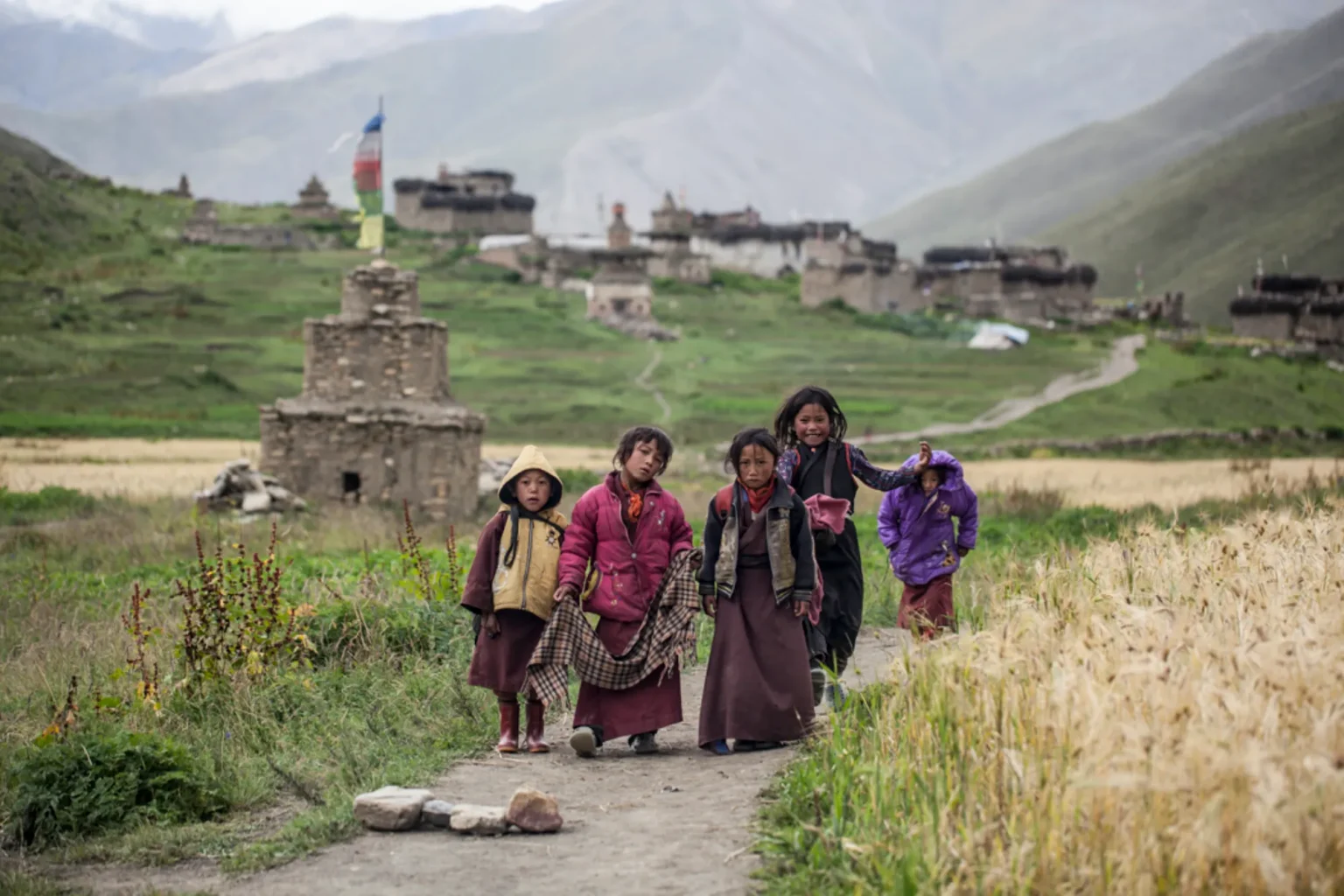
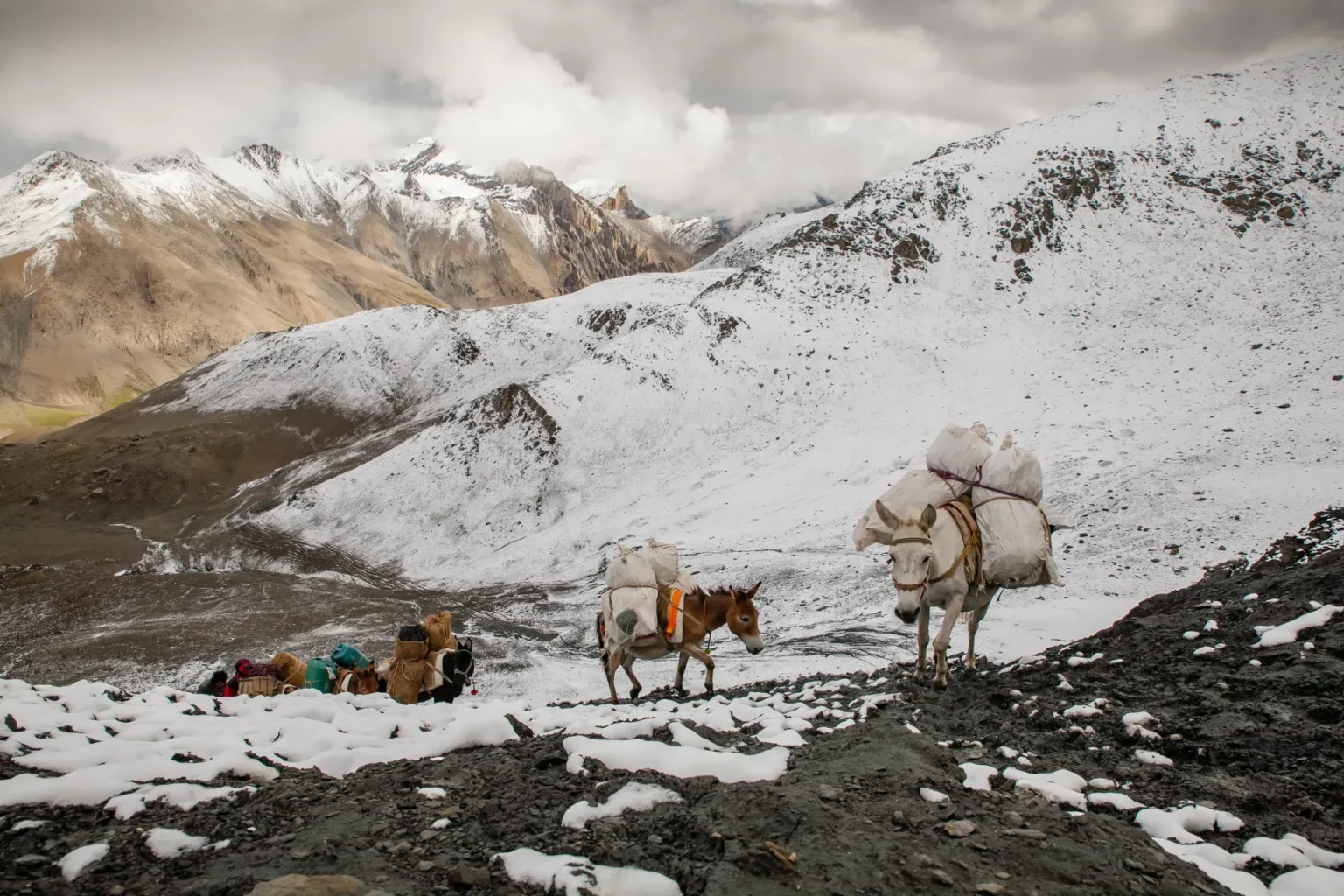
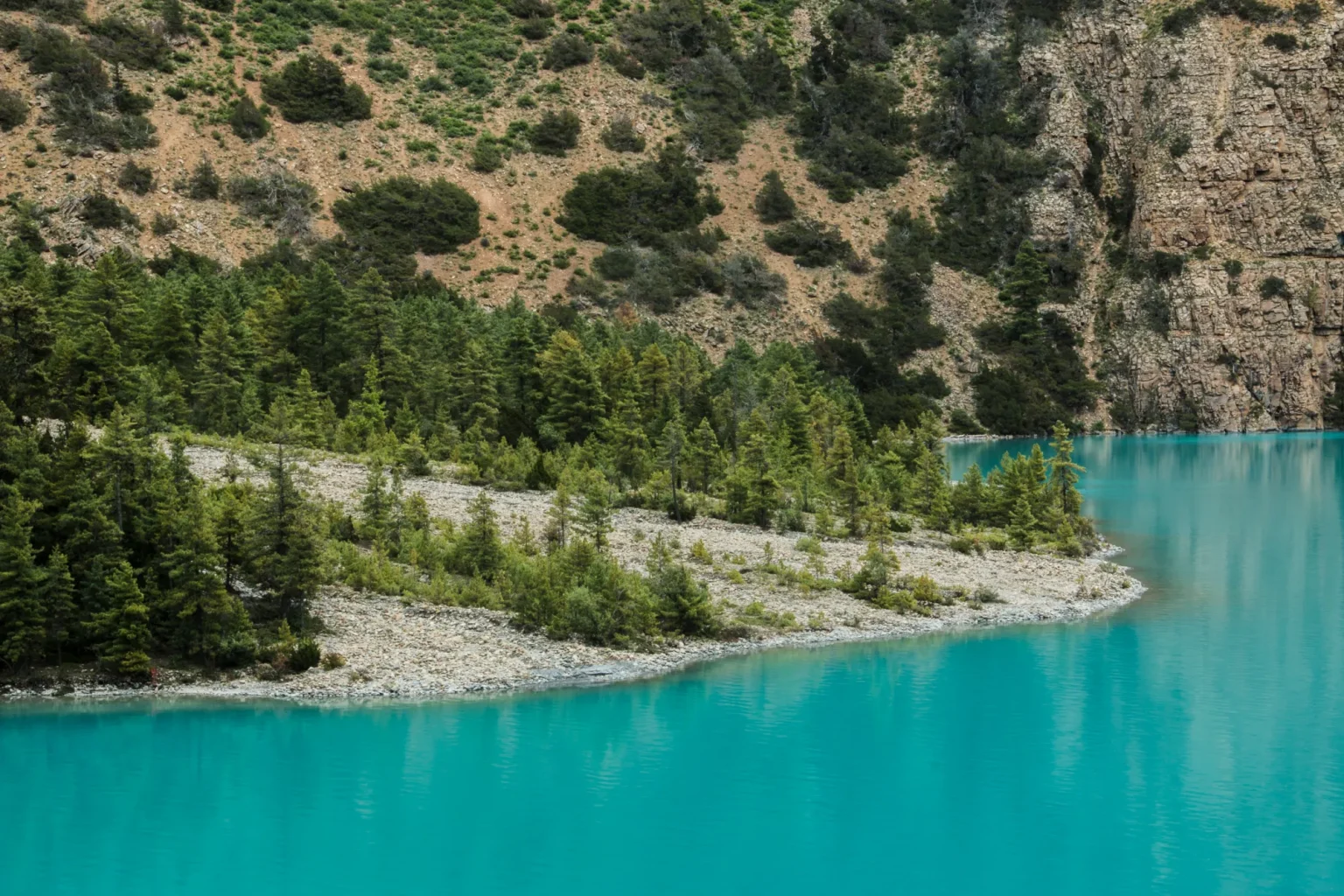
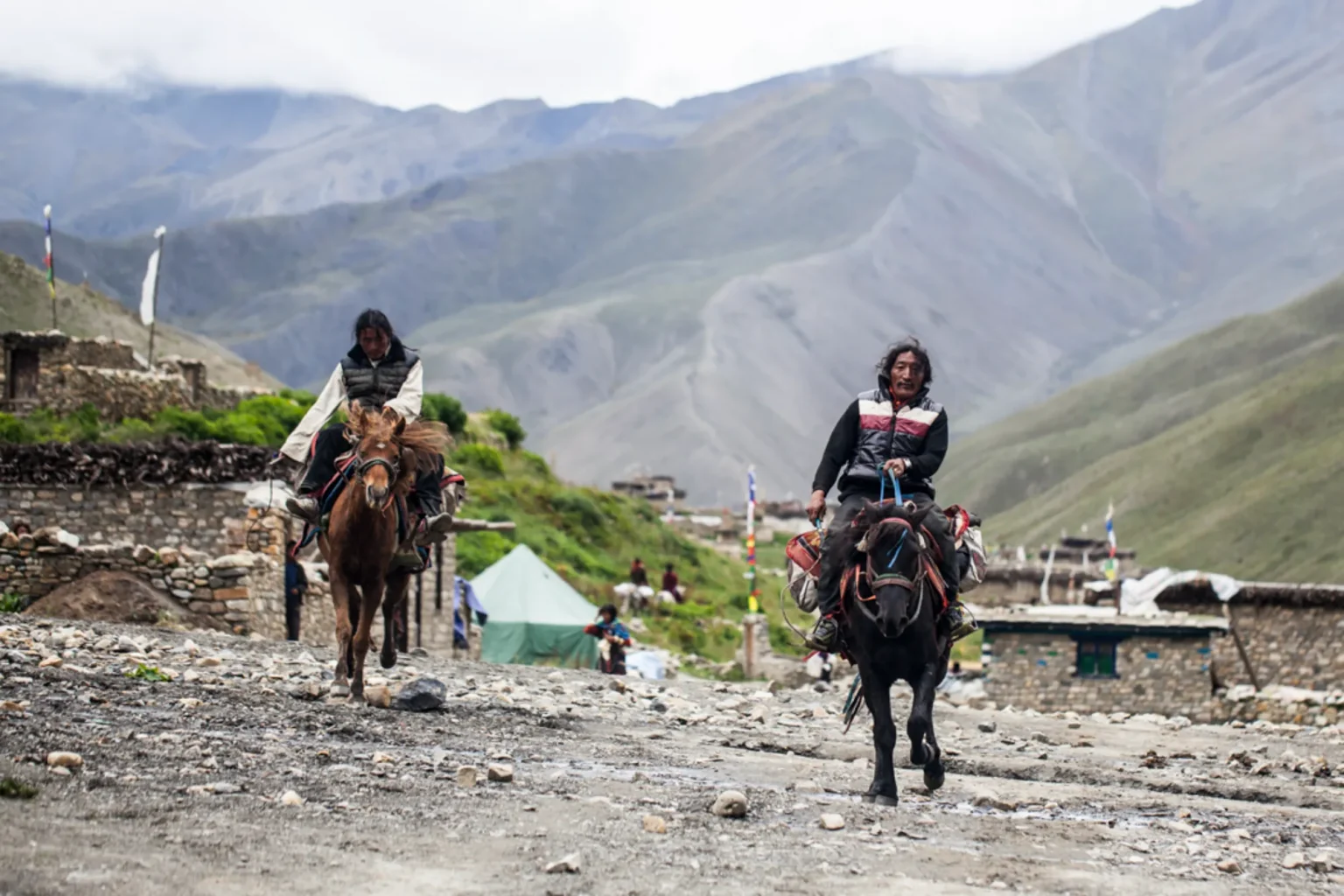
Welcome in Nepal! We will pick you up at the international airport in Kathmandu, and bring you to your hotel in the backpackers area of Thamel.
airport transfer – hotel
After a good night of sleep and hopefully beating the jetlag, we will meet again for a pre-trip meeting. We will introduce you to your mountain guide and we will discuss the itinerary. If you have any questions or requests, please let us know.
Note: please, make sure you bring your passport to the meeting, along with your travel insurance policy. Carry both the original policy and a copy for us. We wil also request you to clear the due balance, if any.
What’s next? You can use this day to adjust to the different timezone, altitude and climate. Also, you can prepare yourself for your trek and do some last shoppings at one of the many outdoor gear shops around your hotel.
breakfast – hotel
Today, we take the bus to Nepalganj. This will take about 9 hours. Nepalganj is a city southwest from Kathmandu, near the border with India.
breakfast – bus – hotel
Option: To save time, you can opt for a 55-minute flight to Nepalganj, instead of taking the bus. This would give you the opportunity to visit bazaars and surrounding villages that are populated by different ethnic people. We can also visit the holy temple of Bageshori. Contact us for more details.
Early morning, we go to the airport and catch our flight to the village of Juphal (2,320 m). During the 30 minutes flight, we see a rapid change of the landscape below us. It changes from the flat Terai to hills covered by paddy rice fields to the first high mountains of Dolpa.
From Juphal we walk to our campsite in Dunai (2,850 m) where we’ll spend the night.
breakfast – airport transfer – domestic flight – lunch & dinner – tented camp
Today we trek to Lingdo (2,391 m). From Dunai the trail goes a little bit upward and downward, along the Thuli Bheri river and we pass a Buddhist village. A part of the trail is made out of rocks and is narrow at times.
breakfast, lunch & dinner – tented camp
Our trek up to Laina Odar (3,370 m) follows a trail that moves upward slowly. Again on this day the trail ascends upward over the Thuli Bheri river towards the suspension bridge. Today our trek has strenuous ascends.
breakfast, lunch & dinner – tented camp
As a start, the trail moves in the small pass taking for about 45 minutes. From the pass it appears as an easy walk enticing some ascends. A major part of this day we trek through a lovely smelling pine forest. In about 4 hours we will arrive in Nawarpani (3,575 m) we spend the night.
breakfast, lunch & dinner – tented camp
From Nawarpani we trek to Sisaul today. Also today the trail is trouble free. However, in some parts the trekking trail is attractively carved out of rocks. The day ends with an ascend for about half an hour till Chorten and then Sisaul (3,750 m).
breakfast, lunch & dinner – tented camp
Today the trail takes us upward to a tiny pass where we step into the valley of Dho Tarap (4,080 m). In Dho Tarap we pass several small chortens and mani walls and get a view over houses that are built in a Tibetan style.
breakfast, lunch & dinner – tented camp
It’s mainly a day to rest and let our body get more comfortable with the altitude and climate. Nevertheless, we can explore the area a little bit with a short hike or explore the village of Dho Tarap.
breakfast, lunch & dinner – tented camp
Today is an important day as we are trekking to Numa La Base Camp (4,440 m). At the end of the village we can visit the gompa which is merit to visit as well. This gompa also consists an attractive statue of Maitreya.
breakfast, lunch & dinner – tented camp
Today is an exciting day as we climb over 800 meters to cross Numa La pass (5,318 m). We start our day early morning for a strenuous climb for about 3 hours. Once at the pass, if the weather is clear, we will be rewarded with views over an amazing range of snowcapped mountains such as Manaslu, Annapurna, the Shey Shikar and many more. On the other side of the pass we descend about 600 meters again to Danigar (4,631 m) where we spend the night.
breakfast, lunch & dinner – tented camp
This is another beautiful trekking day which we begin early morning. Today we have an excellent outlook on the Norbung Kang and the Baga La range. the smooth and easy but regular walk takes us up to Yak Kharka (3,982 m), which is another perfect spot to set up our camp.
breakfast, lunch & dinner – tented camp
Now we trek to Ringmo (3,660 m) and Phoksundo Lake (3,612 m). As we leave Yak Kharka we level up and downhill by fleeting many levels to the tiny pass. Those motivating passes show us the way to the woodland of pines and accompanied by the loving varied sounds of birds. As soon as we get ahead of the thick forests we arrive at Ringmo and Phoksundo Lake.
breakfast, lunch & dinner – tented camp
Today we explore and enjoy the beautiful area of Ringmo and of course the turquoise Phoksundo Lake.
breakfast, lunch & dinner – tented camp
It’s time to trek down again. We trek via Rechi (2,940 m) to Chhepka (2,520 m). Today we trek through the stunning pine forest, birches, bushes and spare broad tress. We also get to view the river very well today.
breakfast, lunch & dinner – tented camp
Today the trek takes us back to Juphal (2,475 m) in about four hours. We follow a trail along a mountain ridge with the river next to us and pass the tiny settlement of Kalagauda (2,070 m). Depending on the season the area is a pasture of wheat, barley but also walnut and apricot.
breakfast, lunch & dinner – tented camp
Early morning, we catch the flight back to Nepalganj and take bus to Kathmandu
breakfast – domestic flight – airport transfer – hotel
Option: To save time, you can opt for a 55-minute flight to Kathmandu, instead of taking the bus. This would give you the opportunity to spend an extra day exploring Kathmandu. Contact us for more details.
Today, we catch the bus back to Kathmandu. This will take about 9 hours.
breakfast – bus – hotel
If it’s the final day of your holiday in Nepal, we will bring you back to the international airport. Goodbye friends! We hope that we will meet each other again in the future.
breakfast – airport transfer
Together, we set a goal and we'll do everything we can to make it happen!
Govinda & Lilly tailor these sample trips to your preferences and budget.
With memories that last a lifetime!
Our guests give us 5-star ratings on Tripadvisor.
ExcellentBased on 33 reviews
 Merel L07/04/2024Best organisation to book your hike We loved our 4-day trip to the Muldai Viewpoint and Poonhill! By Mountain People suggested to do the Muldai Viewpoint combined with Poonhill in 4 days. The hike to Muldai was a climb but doable for everyone with basic condition. We walked to the Muldai top practically on our own with amazing viewpoints during the hike. From the Poonhill viewpoint there were lots of other tourist but also a little bit more comfort so we loved the combination. Especially our guide Pratap made the trip unforgetable. He knows everything about the nature, birds and animals. By Mountain People helped us with the preparation and fixed everything for us. Permits, food, overnight homestays etc. Would recomment to everyone. Was the best four days of our trip to Nepal
Merel L07/04/2024Best organisation to book your hike We loved our 4-day trip to the Muldai Viewpoint and Poonhill! By Mountain People suggested to do the Muldai Viewpoint combined with Poonhill in 4 days. The hike to Muldai was a climb but doable for everyone with basic condition. We walked to the Muldai top practically on our own with amazing viewpoints during the hike. From the Poonhill viewpoint there were lots of other tourist but also a little bit more comfort so we loved the combination. Especially our guide Pratap made the trip unforgetable. He knows everything about the nature, birds and animals. By Mountain People helped us with the preparation and fixed everything for us. Permits, food, overnight homestays etc. Would recomment to everyone. Was the best four days of our trip to Nepal Angela M17/03/2024Crafting Memories with By Mountain People in Annapurna When we decided to go to Nepal for our holidays, we knew we wanted to do a trekking in the Annapurna region, but we didnt know from where to start. That's when we met Govinda, who helped us with everything related to our trip, providing a personalised proposal for the 4 days we had, giving us all the information needed, and being a reliable and helpful point of contact during our whole journey before, during and after our trek. In the end we went for the Mulde peak trek, a less crowded route that exceded all expectations. Our guide Ganesh, was the best guide we could have wished for, always with a smile he knew every little secret of the Annapurna range, explaning not only the different routes, but also about the plants & animals present in the area, and about Nepal and its traditions. He was very caring and he made our experience unforgettable. We can only recommend to do a trekking with By Mountain People, they know what they are doing, accomodation and food was included in the total price and we didn't have to worry about anything. Having a guide in the Annapurnas is really an added value, and we can't wait to be back with a little extra time to do the Annapurna circuit next time. If you're looking to get most out of your experience in the Himalayas, and for a personalised and personal approach, then By Mountain People is the right party to team up with.
Angela M17/03/2024Crafting Memories with By Mountain People in Annapurna When we decided to go to Nepal for our holidays, we knew we wanted to do a trekking in the Annapurna region, but we didnt know from where to start. That's when we met Govinda, who helped us with everything related to our trip, providing a personalised proposal for the 4 days we had, giving us all the information needed, and being a reliable and helpful point of contact during our whole journey before, during and after our trek. In the end we went for the Mulde peak trek, a less crowded route that exceded all expectations. Our guide Ganesh, was the best guide we could have wished for, always with a smile he knew every little secret of the Annapurna range, explaning not only the different routes, but also about the plants & animals present in the area, and about Nepal and its traditions. He was very caring and he made our experience unforgettable. We can only recommend to do a trekking with By Mountain People, they know what they are doing, accomodation and food was included in the total price and we didn't have to worry about anything. Having a guide in the Annapurnas is really an added value, and we can't wait to be back with a little extra time to do the Annapurna circuit next time. If you're looking to get most out of your experience in the Himalayas, and for a personalised and personal approach, then By Mountain People is the right party to team up with. Jess M07/03/2024Keep your head in the clouds but your feet on the trail. The hard miles brought big smiles on this trip with By Mountain People. They were flexible, positive, and really just a joy to be with. Made for a fun and easy trip. I continue to recommend By Mountain People to both friends and family if they have a thought of doing a trek in Nepal. Many Thank You Guys!
Jess M07/03/2024Keep your head in the clouds but your feet on the trail. The hard miles brought big smiles on this trip with By Mountain People. They were flexible, positive, and really just a joy to be with. Made for a fun and easy trip. I continue to recommend By Mountain People to both friends and family if they have a thought of doing a trek in Nepal. Many Thank You Guys! Sean G18/02/2024Great people for a great adventure! I can't say enough about how well everything was orchestrated. Our guide and porter were wonderful and very friendly. Nepal is a beautiful country with very friendly people. It's been a few months now and I still think of the trekking almost daily. If I ever have another opportunity to hike in Nepal, I would be blessed! Thank you Govinda!
Sean G18/02/2024Great people for a great adventure! I can't say enough about how well everything was orchestrated. Our guide and porter were wonderful and very friendly. Nepal is a beautiful country with very friendly people. It's been a few months now and I still think of the trekking almost daily. If I ever have another opportunity to hike in Nepal, I would be blessed! Thank you Govinda! Anouk K10/12/2023Jiri - Everest Base Camp My friend and I booked a 20+ day trek with Lily & Govinda from mid-nov to begin-dec. We loved their personal approach in arranging the trip, from preparations and choosing which trek to go for, to regular check-ins during and a great feedback/debrief session afterwards! We started from Jiri instead of the popular way of flying to Lukla. That was a great experience and an absolute recommend to start lower if you have time!
Anouk K10/12/2023Jiri - Everest Base Camp My friend and I booked a 20+ day trek with Lily & Govinda from mid-nov to begin-dec. We loved their personal approach in arranging the trip, from preparations and choosing which trek to go for, to regular check-ins during and a great feedback/debrief session afterwards! We started from Jiri instead of the popular way of flying to Lukla. That was a great experience and an absolute recommend to start lower if you have time! eliza b19/11/2023Magnificent slow trek and bird watching to Khopra Danda! Magnificent trek!! In October 2023 the two of us did this beautiful trek organized by BMP. It all started 6 months earlier, when I was looking for a company that would put people first in organizing treks in Nepal. What a nice coincidence when I learned that Govinda, a former language student of mine, happened to be the owner of By Mountain People, an organization that had customized and small scale treks as its core business! We had very nice and informative preparative talks about our wishes. Being almost 70 years of age, we wanted to have sufficient possibilities to adapt our journey on the way, in case the altitude would cause problems. Also we wanted to visit places off the beaten track and see something of village life on the way. Govinda suggested the Khopra Danda trek with some extra days so we could shorten the daily walking distance. This was a very good advice and he organized it very well! We met Govinda again in Kathmandu before we started out. He introduced us to our guide Pratap Gurung. Pratap was really a very excellent guide!! His knowledge of the natural surroundings and especially of the birds were truly amazing!! He was very attentive to our wellbeing and patiently answered our many questions. He taught us so much about the different species and habitats of all the birds he would point out to us. His experience made that we always felt safe and well looked after. Also we learnt that Govinda stayed regularly in contact to ensure that everything went well. Following our 2 weeks of trekking, BMP also organized an extra 4 days visit to Chitwan National Park. Here we stayed in the nice Safari Club hotel. Her also we were very happy with our guide Yadav Duwadi He is a nice and calm guide with a lot of knowledge and very attentive. We absolutely recommend this “slow trekking” by BMP! Specially for senior travellers such as us, but also for everybody who wants to fully enjoy the beauty of the Himalayas. A guide such as Pratap Gurung was perfectly suited for this type of trekking. Thank you BMP!! Thijl and Linda
eliza b19/11/2023Magnificent slow trek and bird watching to Khopra Danda! Magnificent trek!! In October 2023 the two of us did this beautiful trek organized by BMP. It all started 6 months earlier, when I was looking for a company that would put people first in organizing treks in Nepal. What a nice coincidence when I learned that Govinda, a former language student of mine, happened to be the owner of By Mountain People, an organization that had customized and small scale treks as its core business! We had very nice and informative preparative talks about our wishes. Being almost 70 years of age, we wanted to have sufficient possibilities to adapt our journey on the way, in case the altitude would cause problems. Also we wanted to visit places off the beaten track and see something of village life on the way. Govinda suggested the Khopra Danda trek with some extra days so we could shorten the daily walking distance. This was a very good advice and he organized it very well! We met Govinda again in Kathmandu before we started out. He introduced us to our guide Pratap Gurung. Pratap was really a very excellent guide!! His knowledge of the natural surroundings and especially of the birds were truly amazing!! He was very attentive to our wellbeing and patiently answered our many questions. He taught us so much about the different species and habitats of all the birds he would point out to us. His experience made that we always felt safe and well looked after. Also we learnt that Govinda stayed regularly in contact to ensure that everything went well. Following our 2 weeks of trekking, BMP also organized an extra 4 days visit to Chitwan National Park. Here we stayed in the nice Safari Club hotel. Her also we were very happy with our guide Yadav Duwadi He is a nice and calm guide with a lot of knowledge and very attentive. We absolutely recommend this “slow trekking” by BMP! Specially for senior travellers such as us, but also for everybody who wants to fully enjoy the beauty of the Himalayas. A guide such as Pratap Gurung was perfectly suited for this type of trekking. Thank you BMP!! Thijl and Linda Gira_sv12/09/2023Tilicho Lake and Annapurna Circuit I went on a 19-day trek on the Annapurna Circuit. I had great communication with Lily and Govinda before arriving in Nepal and throughout my trip. They shared with me all the information that I needed. Ganesh, and a porter, Nima. Both of them were incredibly kind. They literally held my hand through the toughest parts of the trek and we also had lots of fun playing cards, sharing anecdotes and trying to learn each other’s languages. The Annapurna circuit itself is incredibly beautiful and diverse. Since I arrived at the end if the monsoon season there were still some rains and landslides which made the days at lower altitudes a little tricky but once we started to ascend the weather changed and we had wonderful views of the mountains on this range and visited several Tibetan towns and Gompas. Overall, I had a great experience with them I would take a trip again with them in a heartbeat. Thanks, Ganesh, Nima, Lily, and Govinda!
Gira_sv12/09/2023Tilicho Lake and Annapurna Circuit I went on a 19-day trek on the Annapurna Circuit. I had great communication with Lily and Govinda before arriving in Nepal and throughout my trip. They shared with me all the information that I needed. Ganesh, and a porter, Nima. Both of them were incredibly kind. They literally held my hand through the toughest parts of the trek and we also had lots of fun playing cards, sharing anecdotes and trying to learn each other’s languages. The Annapurna circuit itself is incredibly beautiful and diverse. Since I arrived at the end if the monsoon season there were still some rains and landslides which made the days at lower altitudes a little tricky but once we started to ascend the weather changed and we had wonderful views of the mountains on this range and visited several Tibetan towns and Gompas. Overall, I had a great experience with them I would take a trip again with them in a heartbeat. Thanks, Ganesh, Nima, Lily, and Govinda! Explore5828402007330/07/2023Small but super professional trekking company! Wish we could go back already! Govinda and Lilly just went above and beyond for my friend and I!! Shortly before arriving in Nepal, I started experiencing knee pain. I got so worried about the trek, but they changed our itinerary without any fuss whatsoever. They got us the most caring and knowledgeable trekking guide Ganesh. And they checked in with me frequently during the trek, to check if I was doing ok and enjoying. After the trek they even organized a very nice jungle safari to Chitwan NP for us. Their great tips and flexible attitude before and during our trip made it a HUGE succes!! Govinda and Lily thank you so much for your patience and helpful advice. I will be back for sure!
Explore5828402007330/07/2023Small but super professional trekking company! Wish we could go back already! Govinda and Lilly just went above and beyond for my friend and I!! Shortly before arriving in Nepal, I started experiencing knee pain. I got so worried about the trek, but they changed our itinerary without any fuss whatsoever. They got us the most caring and knowledgeable trekking guide Ganesh. And they checked in with me frequently during the trek, to check if I was doing ok and enjoying. After the trek they even organized a very nice jungle safari to Chitwan NP for us. Their great tips and flexible attitude before and during our trip made it a HUGE succes!! Govinda and Lily thank you so much for your patience and helpful advice. I will be back for sure! Jonatan D27/02/2020Otrolig resa i Nepal Vi hade en jättebra resa i Nepal! Govinda på By Mountain People var superhjälpsam med att tillgodese våra önskemål och att skräddarsy en resplan som passade oss perfekt. Han såg till att vi fick med alla våra önskemål. Vi hann med vandring i de fantastiska bergen samt en otrolig dag med fågelsådning strax utanför Kathmandu. Jag kan verkligen rekommendera By Mountain People om du vill ha en unik upplevelse!
Jonatan D27/02/2020Otrolig resa i Nepal Vi hade en jättebra resa i Nepal! Govinda på By Mountain People var superhjälpsam med att tillgodese våra önskemål och att skräddarsy en resplan som passade oss perfekt. Han såg till att vi fick med alla våra önskemål. Vi hann med vandring i de fantastiska bergen samt en otrolig dag med fågelsådning strax utanför Kathmandu. Jag kan verkligen rekommendera By Mountain People om du vill ha en unik upplevelse! Gabriel G22/02/2020Father and son Nepal trek By mountain people organised an incredible trip through Gokyo Lake and EBC. Everything ran smoothly, they took care of all the little details and genuinely care about you and your experience throughout. Handled everything with a smile and extreme professionalism - can not recommend them enough! Our amazing guide Ganesh is the reason we can look back on the trek successfully, he helped us at every step and is an all round great guy - be sure to ask for Ganesh he will make your trip unforgettable I cannot wait to book again:)
Gabriel G22/02/2020Father and son Nepal trek By mountain people organised an incredible trip through Gokyo Lake and EBC. Everything ran smoothly, they took care of all the little details and genuinely care about you and your experience throughout. Handled everything with a smile and extreme professionalism - can not recommend them enough! Our amazing guide Ganesh is the reason we can look back on the trek successfully, he helped us at every step and is an all round great guy - be sure to ask for Ganesh he will make your trip unforgettable I cannot wait to book again:)
Click on our photo below to chat on WhatsApp
